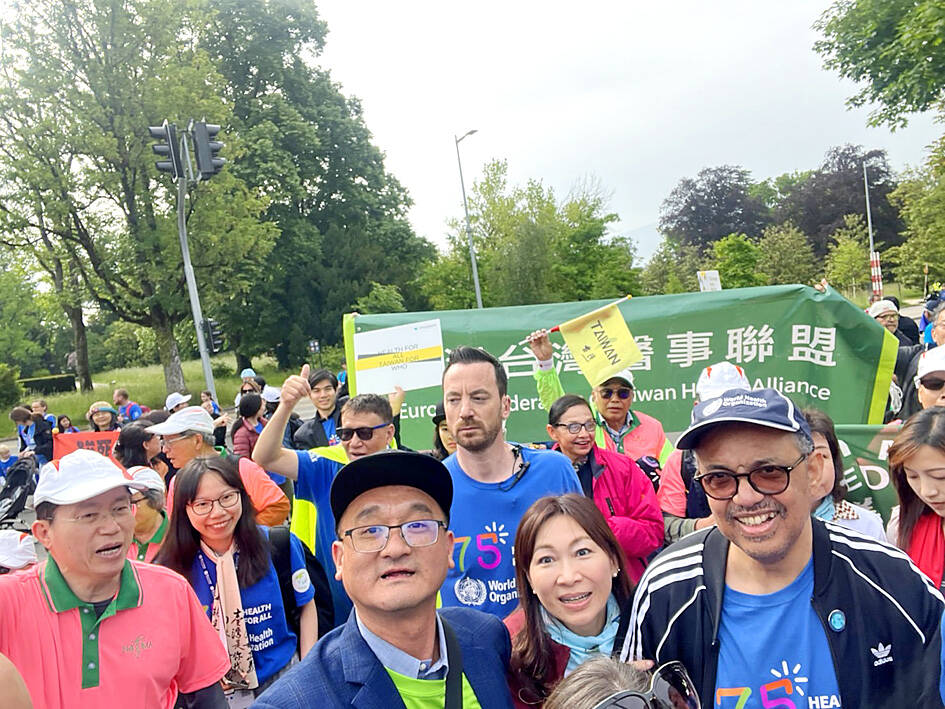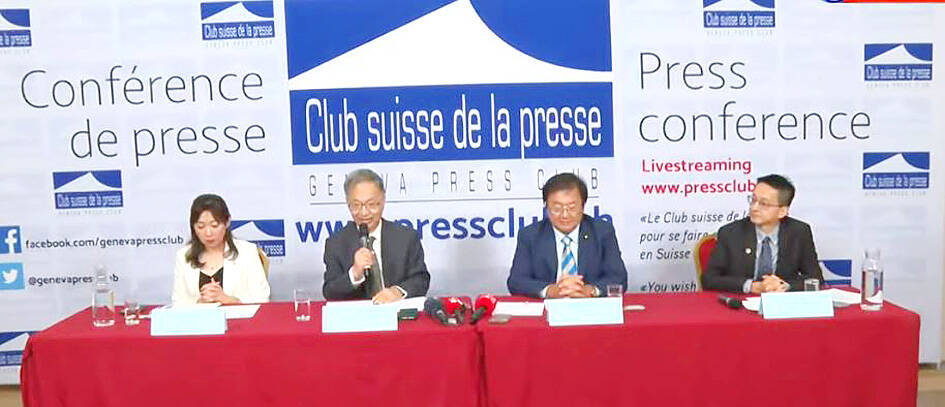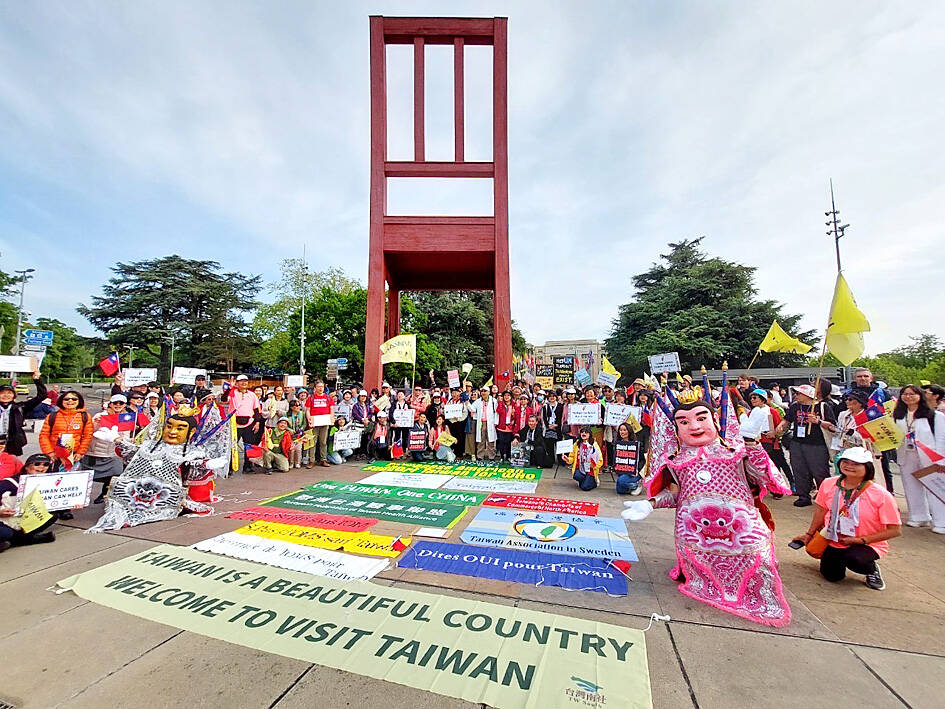The Formosa Club and 926 lawmakers from 29 countries signed a letter advocating for Taiwan’s inclusion in the World Health Assembly (WHA) and all WHO meetings, mechanisms and activities, as the 76th WHA began yesterday.
Formosa Club cochairs and members, along with lawmakers from the European Parliament and parliaments of 28 European countries and Canada, jointly signed the letter sent on Friday.
The Formosa Club, inaugurated in 2019, is a platform for cross-party European and Canadian legislators to work to enhance relations with Taipei and connect Taiwan with the world.

Photo courtesy of the Taiwan United Nations Alliance
The signatories urged WHO Director-General Tedros Adhanom Ghebreyesus to invite Taiwan to participate as an observer in the WHA, the letter said.
Taiwan notified the WHO of suspicious cases of “atypical pneumonia” when most of the world was still unaware of COVID-19 and “impressed the world with its effective and resourceful control of the virus,” it said.
The nation also donated masks and medical supplies to more than 80 countries around the world during the early stage of the pandemic, when global supply chains were overwhelmed by the sudden spike in demand for epidemic prevention equipment, it said.

Photo: Screenshot from livestream
Taiwan’s success in combating the pandemic “demonstrated its capabilities and willingness to contribute to international public health,” it said.
“A comprehensive public health network cannot tolerate any breaches,” it said.
Taiwan also joined the international community in providing timely assistance to Ukrainian refugees, donating 27 tonnes of medical supplies and more than 700 tonnes of humanitarian relief supplies, it said.

Photo courtesy of the Taiwan United Nations Alliance
Taiwan also donated more than US$41 million to Ukraine’s neighboring countries to help settle refugees fleeing Russia’s invasion and a further US$2 million to three Ukrainian cities to help provide relief during the winter months, it said.
“Our collective efforts and solidarity remain essential if we are to uphold the universal values of freedom and democracy, and the rules-based international order,” it said.
Including Taiwan in the WHO system would help realize its goal of “health for all,” but failing to do so would be “unjust,” it said.
Taiwan’s exclusion would not only be detrimental to the health rights of Taiwanese, but also “denies the international community the opportunity of benefiting from Taiwan’s contributions,” it said.
In Taipei, the Ministry of Foreign Affairs yesterday on Twitter thanked the lawmakers for the letter, and asked Tedros: “Why not just let Taiwan help?”
Despite strong support from democratic allies around the world, Taiwan as of yesterday has not been invited to participate in this year’s assembly for the sixth consecutive year.
The WHA is to run until Tuesday in Geneva.
Minister of Health and Welfare Hsueh Jui-yuan (薛瑞元), who is leading a mission to Switzerland, held a news conference yesterday conveying Taiwan’s wish to participate in the WHO.
He also expressed regret and dissatisfaction that Taiwan has been excluded from taking part due to political interference.
The Republic of China was expelled from the WHO in 1972 after losing its UN seat to the People’s Republic of China over the issue of China’s representation.
Since then, Taiwan has not been able to attend the WHA due to objections by China, except from 2009 to 2016, when it was invited as an observer under the name “Chinese Taipei” during the Chinese Nationalist Party (KMT) administration.
Additional reporting by staff writer and CNA

MAKING WAVES: China’s maritime militia could become a nontraditional threat in war, clogging up shipping lanes to prevent US or Japanese intervention, a report said About 1,900 Chinese ships flying flags of convenience and fishing vessels that participated in China’s military exercises around Taiwan last month and in January last year have been listed for monitoring, Coast Guard Administration (CGA) Deputy Director-General Hsieh Ching-chin (謝慶欽) said yesterday. Following amendments to the Commercial Port Act (商港法) and the Law of Ships (船舶法) last month, the CGA can designate possible berthing areas or deny ports of call for vessels suspected of loitering around areas where undersea cables can be accessed, Oceans Affairs Council Minister Kuan Bi-ling (管碧玲) said. The list of suspected ships, originally 300, had risen to about

DAREDEVIL: Honnold said it had always been a dream of his to climb Taipei 101, while a Netflix producer said the skyscraper was ‘a real icon of this country’ US climber Alex Honnold yesterday took on Taiwan’s tallest building, becoming the first person to scale Taipei 101 without a rope, harness or safety net. Hundreds of spectators gathered at the base of the 101-story skyscraper to watch Honnold, 40, embark on his daredevil feat, which was also broadcast live on Netflix. Dressed in a red T-shirt and yellow custom-made climbing shoes, Honnold swiftly moved up the southeast face of the glass and steel building. At one point, he stepped onto a platform midway up to wave down at fans and onlookers who were taking photos. People watching from inside

Japan’s strategic alliance with the US would collapse if Tokyo were to turn away from a conflict in Taiwan, Japanese Prime Minister Sanae Takaichi said yesterday, but distanced herself from previous comments that suggested a possible military response in such an event. Takaichi expressed her latest views on a nationally broadcast TV program late on Monday, where an opposition party leader criticized her for igniting tensions with China with the earlier remarks. Ties between Japan and China have sunk to the worst level in years after Takaichi said in November that a hypothetical Chinese attack on Taiwan could bring about a Japanese

STREAMLINED: The dedicated funding would allow the US to transfer equipment to Taiwan when needed and order upgraded replacements for stockpiles, a source said The US House of Representatives on Thursday passed a defense appropriations bill totaling US$838.7 billion, of which US$1 billion is to be allocated to reinforcing security cooperation with Taiwan and US$150 million to replace defense articles provided to the nation. These are part of the Consolidated Appropriation Act, which the US House yesterday passed with 341 votes in favor and 88 against. The act must be passed by the US Senate before Friday next week to avoid another government shutdown. The US House Committee on Appropriations on Monday unveiled the act, saying that it allocates US$1 billion for the Taiwan Security Cooperation Initiative